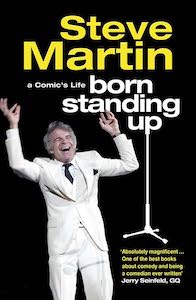
Born Standing Up
Born Standing Up. By Steve Martin. 208 pages.
In the late 1970s, Steve Martin was the top stand-up comedian in the United States. At the peak of his career, he was regularly selling out 30,000 seat stadiums, event after event, year after year. And then, in 1981, he quit - forever. Born Standing Up is the story of how he rose - and why he left.
I did stand-up comedy for eighteen years. Ten of those years were spent learning, four years were spent refining, and four were spent in wild success.
The book is a pretty typical celebrity novel, and unfortunately lacks the magic I found in Shopgirl. He describes his life, with its up and downs; however he seems more humble than other celebrities. He makes some effort to describe his classic jokes, and the inspiration behind them; but being unfamiliar with them, the references were lost on me. I’ve seen and enjoyed a few of Steve Martin’s movies, such as ¡Three Amigos!, but those films are not referenced in the book - it ends with his comedy career.
Martin got his start as a child, where an initial obsession with magic led to a job at Disneyland. Martin confesses he was not a talented performer but found “working around that minor detail made me inventive.” He is grateful to all the people who put up with his bad magic act, and his interest in entertainment never flags. In his words, “Who wouldn’t want to be in show business?”. After graduating high school, he finds work in small venues, such as Disneyland competitor Knott’s Berry Farm, acting in various shows four to five times a day. While it wasn’t stardom, it allowed him to experiment with different material and gain confidence.
One of the things I found most interesting in the book was how unestablished “comedy” was in the 60s. There were no comedy clubs when Steve Martin was coming up, and he couldn’t rely on just his comedy skills to book a gig. In addition to telling jokes, he incorporated magic and the banjo into his act. The lack of structure led to a lot of creativity; Martin uses props and physical action to get a laugh. He also has little time for theorizing, and does not try to formulate a grand theory of comedy to explain his brand of humor. Martin believes in observation and iteration - noticing when you bomb, and when the audience laughs.
In a college psychology class, I had read a treatise on comedy explaining that a laugh was formed when the storyteller created tension, then, with the punch line, released it. I didn’t quite get this concept, nor do I still.
Why did he leave stand-up? On one hand, he was financially secure for the first time in his career, and he was all too aware he could be just a flash in the pan—shouldn’t he milk his newfound success for all it’s worth? On the other hand, playing at large venues that had booked him years in advance drained all the joy out of comedy. No longer could he innovate; An audience of 30,000 is not the place to try out new material. He couldn’t even see the crowd he was playing to, or even hear their laughter. His life had become automatic: traveling to a venue, repeating the same jokes to an unknown audience, and then fitful sleep in a hotel room. Long gone were his friends, or the days where he could take his small audience outside the theater to perform.
Being a celebrity did not really fit Martin’s personality, and he found that innocent conversations would soon devolve into autographs for their “nephew”. He was expected to be the guy he was onstage at all times, when to him, his show was only that: a show. Most frightening of all were the stalkers and anonymous phone calls.
Cars would follow me recklessly on the freeway, and I worried for the passengers’ lives as the driver hung out the window, shouting, “I’m a wild and craaaazzzzyy guy!” while steering with one hand and holding a beer in the other.
A panic attack in 1979 led Martin to stop, though he did honor all the shows he had already booked. He parlayed his fame into the movie industry, writing and starring in a movie (The Jerk). He found working in film much more social than the anti-social world of comedy, and never looked back.
Unlike most books, I felt this one was too short. Less than a chapter is spent on his career in Hollywood and as a writer, which was the part I was most interested in. If you’re interested in comedy or like autobiographies, it is a short and fun read. But it is far from a classic.